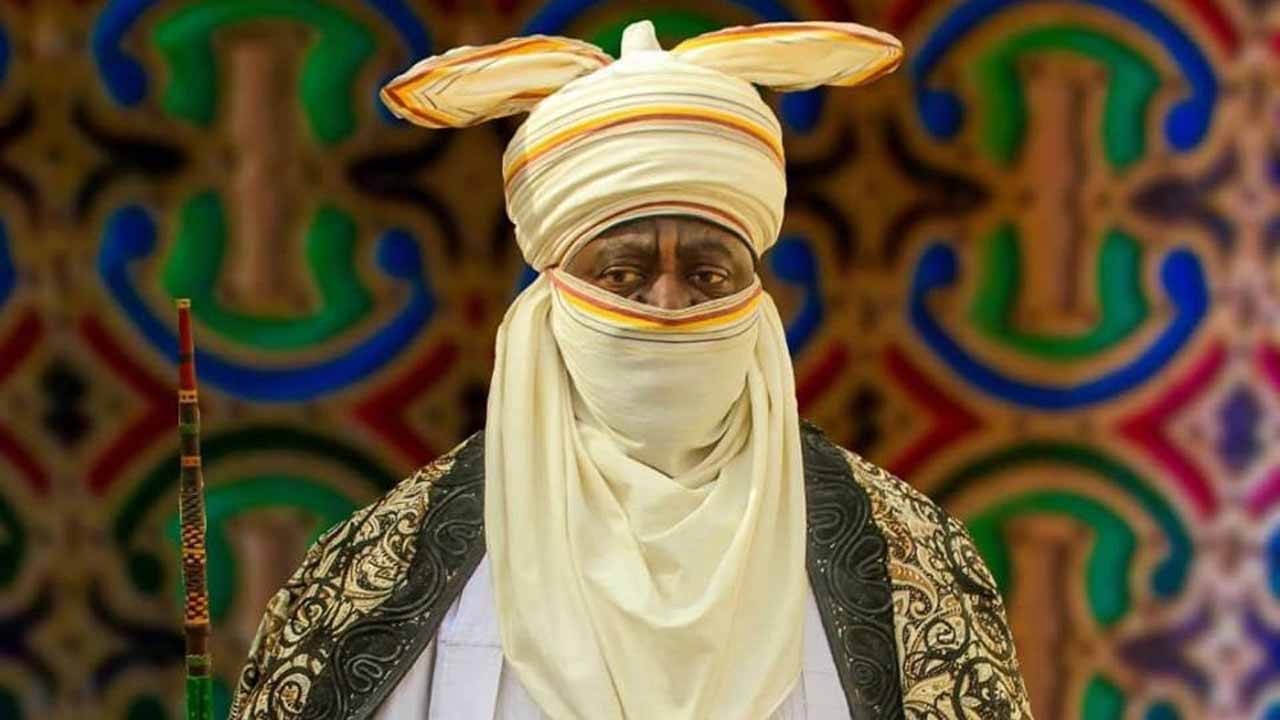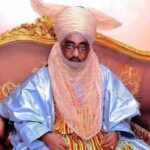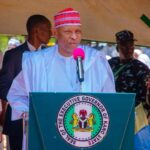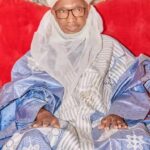Alhaji Aminu Ado Bayero is the 15th Fulani Emir of Kano. In this exclusive with Daily Trust, he shared his memory of growing up in the palace, his relationship with other emirates, created out of the old Kano emirate and solutions to some of the challenges currently confronting the nation. Excerpt:
Growing up in this palace and now as the leader of the palace, how would you describe the two journeys?
Alhamdulillah. It is the pride of every person to succeed his forefathers and ancestors, and we thank Allah for this favour. We all grew up as young ones in the palace but now we are back as elders in the palace. They are two different phenomena. Growing up, I learned a lot from this palace Islamically and traditionally, we thank God for that. But the most important thing is that we all grew up not minding the differences with others, including those that are not by any way members of the royal families. We were treated equally. We grew up as brothers and sisters with any other person not only from Kano but Nigeria at large.
So, when people ask me what the process of growing up was I tell them it is the same process every other child goes through. Of course, the environment counts a lot but the most important thing is that the culture and the tradition are the same. And decent living indicated that what we learnt here is what other kids learn from their parents.
- How El-Rufai ‘secretly’ withdrew son from public school
- Uniuyo shuts down hotels over death of student
The only difference could be in the mode: how tough one is and how soft the other is and this can happen anywhere. We thank God for the upbringing we had. We thank our parents for guiding us and we thank the society for helping us in growing up to this level of our life.
How has that prepared you for this role in terms of bringing the different people in Kano and beyond together?
As I said, we were brought up not to know any difference between us and that has helped us right from when we were young. We mixed well. We did everything together right from primary school to tertiary schools. We attended schools where everybody went. I attended my primary school at Kofar Kudu here and I went to a public secondary school too and then to the university where I met different sets of people and luckily I mixed very well with many of my colleagues that are not from the North or Kano. I think that helped in shaping my life into what I am today. But most important is the influence of our late father, our other fathers – our parents – who contributed a lot in our upbringing in the right way: respecting elders and even those that are below you and always be peaceful in all your dealings with whoever you meet.
The coronation is taking place Saturday, how does it feel?
Well, Alhamdulillah. If I say I am not happy, you will not believe me, but the happiest moment is when they say you have now become the emir, taking into cognizance your father and your great-grandfathers were here before. But “the staff of office” has already been with us. The coronation is just a formality that came with the coming of the colonial masters but has now become an institutionalised tradition; a final part of my ascension to the throne. So, I am really excited and also excited for the people of Kano, Nigeria and most especially, I am excited that I have reached where all the princes want to reach. But everything is a matter of time.
So, I am happy and I thank Allah for this favour. I became emir not because I am better than anyone, not because I am richer than anybody, not because I am wiser than anybody, not because I am older; it is something from God and then destiny. I pray I will give my own quota to the development of our people and the state.
Many social issues and challenges are facing the state, especially with young people. How can the traditional institution support the politicians to tackle these problems?
Actually, the traditional institution is not out to help the politicians alone but the society because society is our primary responsibility – let’s see how we can bring up the youths morally. So, we are talking about the society at large, and the society consists of not only the politicians but so many segments.
So if you are talking about how the traditional institution can come in, I think it would come in on the aspect of politics, the leaders of government, the Ulama, the younger generation, the traditional institution itself, and the business community. I think we all have an obligation in looking at how to help out especially with the moral decadence in the society.
It is a general problem in all countries; it’s not peculiar to Kano alone. So in our little way as custodian of culture and tradition, we are doing everything possible to make sure where the youths are going wrong, we try to educate them and also advise those in government on ways we have seen our forefathers do things for the greater good of the society. As I keep saying, as long as we have good intentions, the Lord will help us to resolve all these problems.
Some people are calling for more enhanced roles for traditional rulers to enable them to deliver more. Do you share this view?
Right from day one, I think I have always said it and I will continue saying that I think the traditional and religious leaders have a role to play whether or not they are in the constitution. But since times have changed, many people assume the constitution is a vital document that is governing society and the country. So I will not say those calling or agitating for inclusion in the constitution are wrong but as far as I am concerned, the religious and cultural leadership we offer to society is more than enough for us.
How is the relationship with you as the head of Kano Council of Traditional Rulers now that there are Karaye, Rano, Gaya and Bichi. How do you bring all these together to serve the entire Kano State?
Yes, it may look like a new phenomenon but as far as I am concerned it is something that we are used to. Before the creation of Jigawa, we had Kano, Hadejia, Gumel and Kazaure. And they are all first-class emirs and the Emir of Kano was the chairman of the council of the emirs then. So, it is not something new when you look at history. But with the creation of Jigawa State, Kano then had only one emir but gradually things have changed and now we have five emirs.
So, whenever something like that comes up, I always look at history and I try as much as I can to learn from how our forbearers managed that council very well. So, up till now I am looking at the relationship between Kano, being the chairman of the council of emirs, and other emirs as smooth and perfect. Of course, there is something new to many of us. We have been here for how long having just one emir and all of a sudden there was the creation of other emirates and don’t forget I was part of the new emirates when they were created. I was in Bichi for a while. I try to reconcile the differences, which are very little and minor. So as far as I am concerned, the relationship is okay and we are working together for the betterment of our society.
Before you were posted to Bichi, you were Wamban Kano and also had many other titles and positions, and people look up to you as a very experienced leader. But what is the relationship now with the people holding the same positions you held?
It is the same situation that has repeated itself. I have been in the system for over 30 years, since 1990, and I have learnt the ropes in a very good way. I know those that are above me and those that are below me and I know we have some people that we are almost of the same level in the institution. And for the 30 years, I have been in the system, I have never had any cause to feel bad because all those that are above me have treated me so well. I have learnt a lot from them; I look at them as my fathers. They taught me a lot along the line and I am still using that experience in what I have become today.
And those that are behind me, I feel they give me all the respect I deserve and I give them their own respect back and we always work together and up till now as the head, it does not have much difference because I still mix and sit with them and talk about issues and resolve problems together. They advise me on issues; I carry them along and I believe they are carrying me along as well.
After you became Emir of Kano, you travelled to many parts of the country. You must have established a relationship with other traditional rulers but the one that many people paid attention to is your visit to Ilorin, Kwara State, where you had this grand ceremony which drew the attention of many people, how is that relationship now?
When you become emir, it encompasses a lot of things. Like I keep saying, leadership in this house is a virtue of continuity; maintaining the culture, maintaining the tradition. We grew up to see the late emir relating very well with traditional rulers outside Kano and maybe outside the North and deep inside us we believe that relationship worked well for the country at large especially at times of crisis.
So if we believe what our fathers did was right and brought a lot of progress to society, we do not have any reason not to follow suit. And that’s why immediately I became emir I tried to see how I can cement the relationship between Kano and other parts of the country, especially at this time that things are a little bit weird and we thank God the visits are a good opportunity to see the traditional rulers, to see the religious leader, to see the government officials and to see even the generality of the people. We sat like a town hall meeting talked and discussed and we shared a lot of information that will help us in the role we are charged to play in society.
Going back to Ilorin was very memorable, that’s where our late mother came from and we consider it our home. So I was not surprised when I went there and I got the reception you are talking about and it is not only in Ilorin. Wherever we went, we get good reception and I believe it was not because of anything but because of the rapport that our former leaders and fathers established. Because we are talking of Ilorin, that we got this we got that, assuming our late father did not marry a princess from Ilorin certainly we will not be talking about all that.
So these are things that those who we took over from did and we are benefiting from them; we are reaping the successes they created when they were in the scene.
The diversity you are talking about is now under threat with different agitations in parts of the country; some calling for restructuring others calling for their own country. Where do you think the leaders need to come together to address this issue?
When somebody talks about restructuring, what does restructuring mean? It means different things to different people. Ask people from the North, East, South or West and you will get different views of what restructuring means. So, it simply means there is a lot of confusion about this restructuring.
So, what I will suggest is for the leaders, the stakeholders to sit down and look at it objectively and come up with a solution that will help the society as a whole, not individuals because a lot of these problems are caused by individuals who are looking at the benefits out of these arguments. But I believe Nigeria will be better and stronger if we remain united.
One of the aims of going round to see my brothers and sisters from outside the North is to try and cement the relationship and set aside our differences, which are minor compared to what we share together. So, I believe the efforts will be fruitful and we will continue to get in touch with the stakeholders. Any time I go to any state, I meet the government, I meet the traditional leaders and I even meet with the people in the state like in a form of a town hall meeting to discuss our differences and see how we can resolve them without tearing ourselves apart. And like I said, in everything we have to do, we have to have a clean mind with good intentions. Once the mind is clean and the intention is good, Allah will help us to get through all these problems we are facing.
In the last two years, Kano State and the emirate have gone through a lot which culminated in you becoming the Emir of Kano and 15 months now, we are about to witness your coronation, which is the last phase of your ascension to the throne. What is now the relationship with all the people involved, the former district heads, people that used to be under this emirate but are now under another emirate?
Before the creation of the new emirates, we have been together with all the new emirs for ages, some for more than 30 years. Let me be specific, since I became the district head and title holder in 1990, all the emirs of the emirates that were created, we have been together and we have a good, harmonious relationship, we respect each other and we have high regard for each other.
Like I said, life keeps changing and if you are not expecting changes in life I think you will be deceiving yourself. Maybe the way changes come are different from the way things are or how we view them but it happens. So, if something happens, how do you manage it in life so that it will work out well and to the benefit of the people?
So, as far as I am concerned, my relationship with the various emirates, the emirs and even those that are under them is still fluent and we have no problem except that now they take orders from different emirates, unlike before when the central emirate is Kano. But certainly, the relationship is good and we will continue to work, Insha Allah, towards improving it to make life easier for the generality of the people of our various emirates.
By Naziru Mikailu, Clement A. Oloyede & Idris Jibrin

 Join Daily Trust WhatsApp Community For Quick Access To News and Happenings Around You.
Join Daily Trust WhatsApp Community For Quick Access To News and Happenings Around You.



